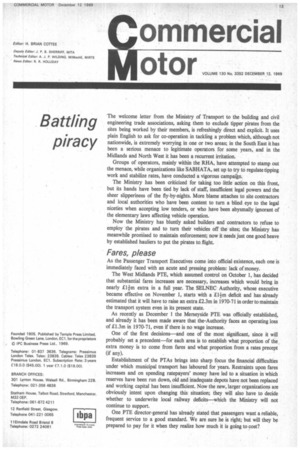Battling piracy
Page 15

If you've noticed an error in this article please click here to report it so we can fix it.
The welcome letter from the Ministry of Transport to the building and civil engineering trade associations, asking them to exclude tipper pirates from the sites being worked by their members, is refreshingly direct and explicit. It uses plain English to ask for co-operation in tackling a problem which, although not nationwide, is extremely wonying in one or two areas; in the South East it has been a serious menace to legitimate operators for some years, and in the Midlands and North West it has been a recurrent irritation.
Groups of operators, mainly within the RHA, have attempted to stamp out the menace, while organizations like SABHATA, set up to try to regulate tipping work and stabilize rates, have conducted a vigorous campaikn.
The Ministry has been criticized for taking too little action on this front, but its hands have been tied by lack of staff, insufficient legal powers and the sheer slipperiness of the fly-by-nights. More blame attaches to site contractors and local authorities who have been content to turn a blind eye to the legal niceties when accepting low tenders, or who have been abysmally ignorant of the elementary laws affecting vehicle operation.
Now the Ministry has bluntly asked builders and contractors to refuse to employ the pirates and to turn their vehicles off the sites; the Ministry has meanwhile promised to maintain enforcement; now it needs just one good heave by established hauliers to put the pirates to flight.
Fares, please
As the Passenger Transport Executives come into official existence, each one is immediately faced with an acute and pressing problem: lack of money.
The West Midlands PTE, which assumed control on October 1, has decided that substantial fares increases are necessary, increases which would bring in nearly £171m extra in a full year. The SELNEC Authority, whose executive became effective on November 1, starts with a £1+m deficit and has already estimated that it will have to raise an extra £2.3m in 1970-71 in order to maintain the transport system even in its present state.
As recently as December 1 the Merseyside PTE was officially established, and already it has been made aware that the-Authority faces an operating loss of £1.3m in 1970-71, even if there is no wage increase.
One of the first decisions—and one of the most significant, since it will probably set a precedent—for each area is to establish what proportion of thern extra money is to come from fares and what proportion from a rates precept (if arty).
Establishment of the PTAs brings into sharp focus the financial difficulties under which municipal transport has laboured for years. Restraints upon fares increases and on spending ratepayers' money have led to a situation in which reserves have been run down, old and inadequate depots have not been replaced and working capital has been insufficient. Now the new, larger organizations are obviously intent upon changing this situation; they will also have to decide whether to underwrite local railway deficits—which the Ministry will not continue to support.
One PTE director-general has already stated that passengers want a reliable, frequent service to a good standard. We are sure he is right; but will they be prepared to pay for it when they realize how much it is going to cost?
























































































































































